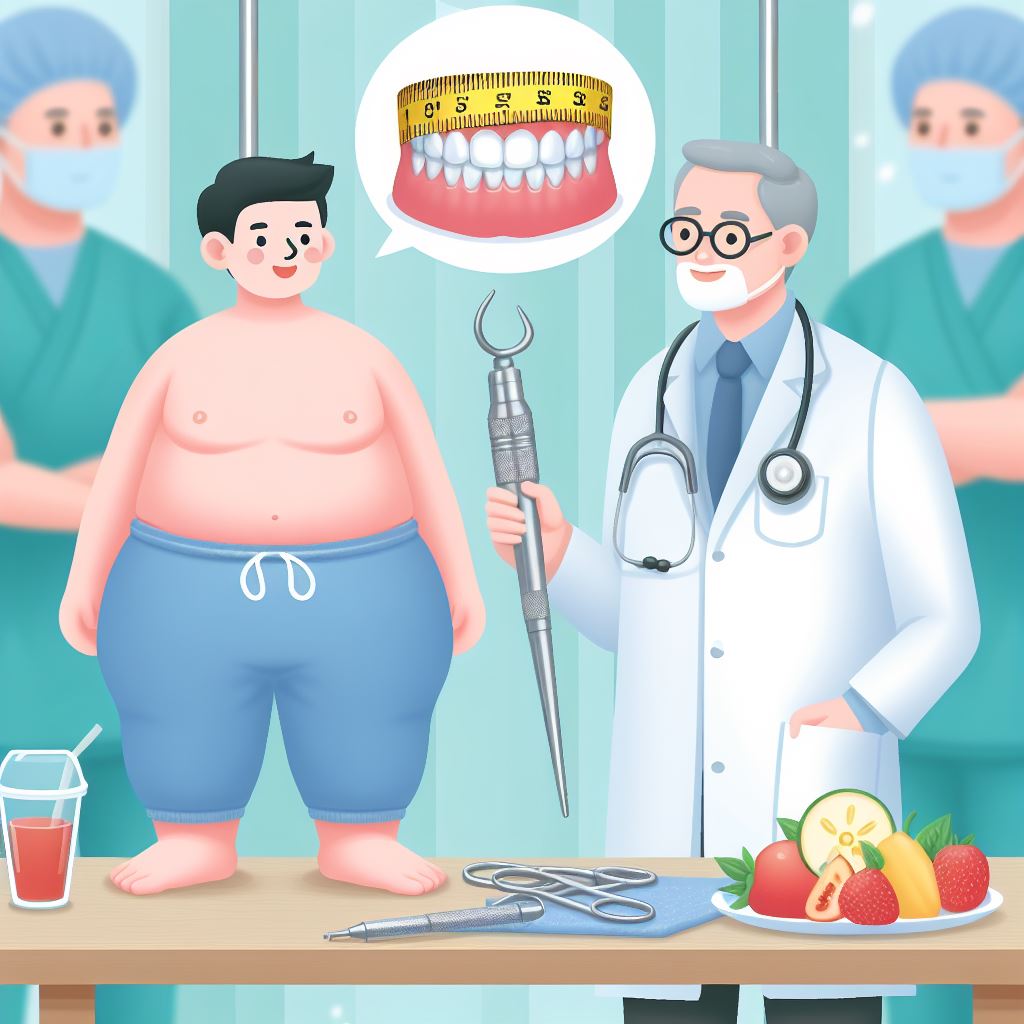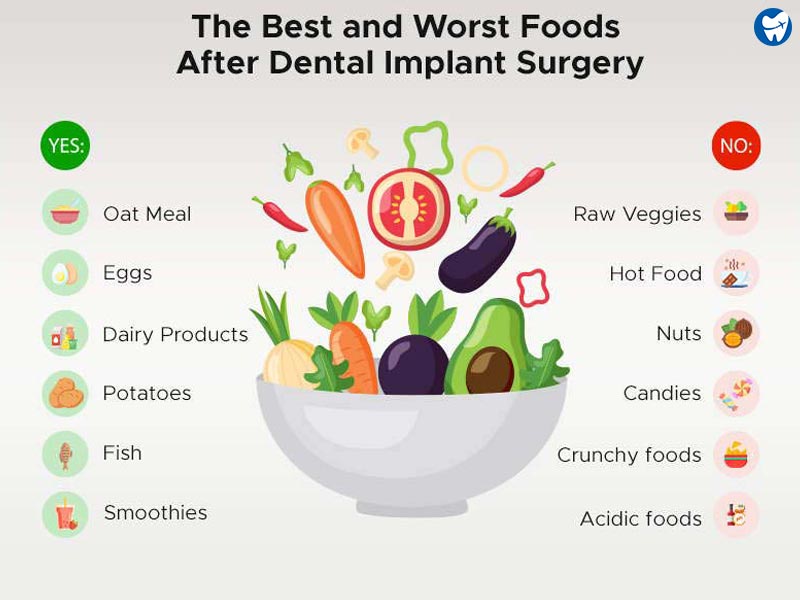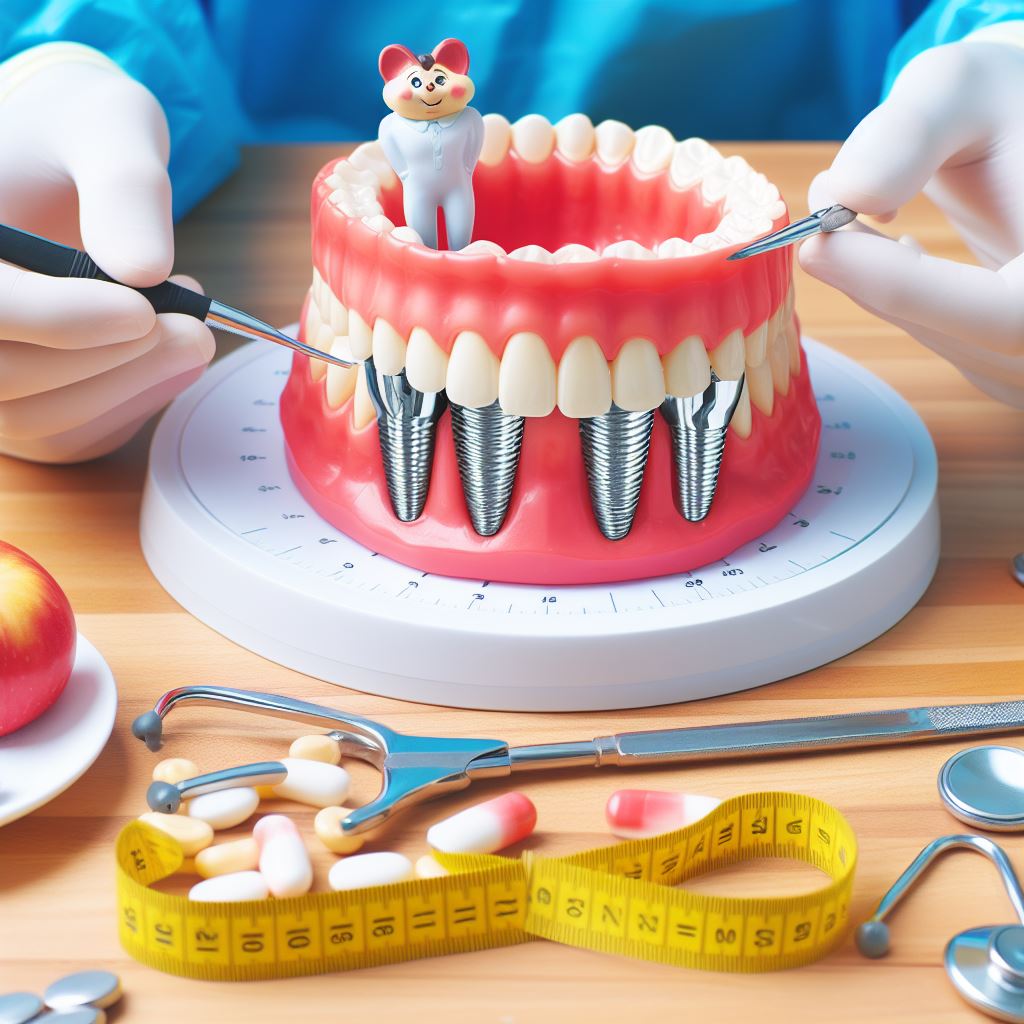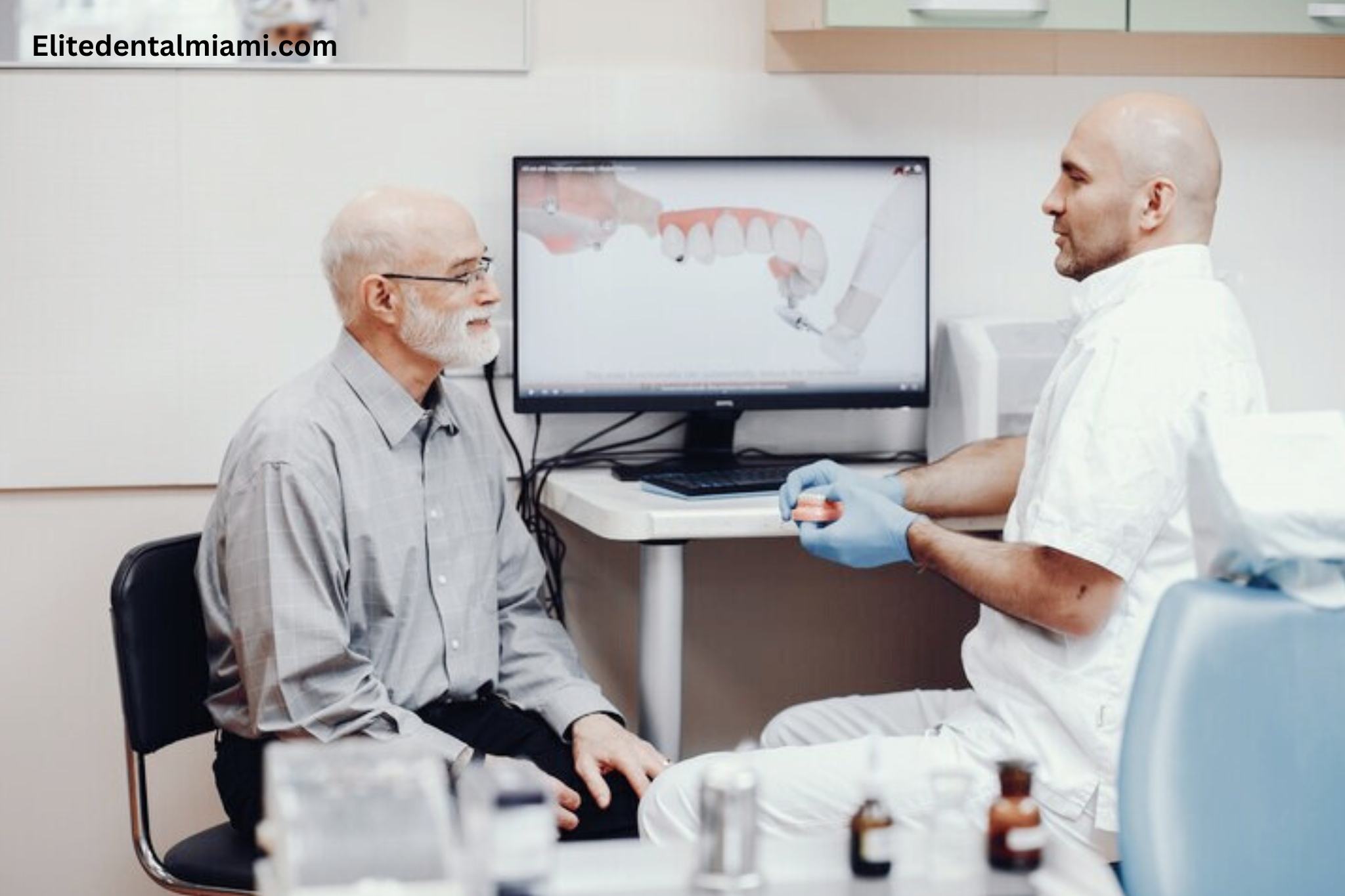Weight loss after dental implant surgery is not a direct result of the procedure, but dietary habits may temporarily change due to the need to consume softer foods during the healing process. When undergoing dental implant surgery, it is important to be aware of the potential changes in dietary habits that may occur during the recovery process.
While weight loss is not a direct result of the procedure itself, there may be temporary adjustments to your diet in order to accommodate the healing of your mouth. It is important to consume softer foods during this time to avoid any discomfort or damage to the implant.
This article discusses the relationship between dental implant surgery and weight loss, as well as tips for maintaining a balanced diet during the recovery process.

What Is Dieting After Implant Surgery?
After dental implant surgery, post-implant surgery dieting is necessary for weight loss. This diet involves consuming softer foods while your mouth heals, although the surgery itself does not directly cause weight loss. Find out the dos and don’ts of post-implant surgery dieting to maintain a balanced diet during recovery.
After undergoing dental implant surgery, it’s crucial to follow a post-implant surgery diet to support the healing process and optimize weight loss. The right diet can help reduce the risk of complications and promote effective recovery. Here are some key guidelines to consider:
- Soft Foods: In the days immediately following surgery, it’s best to stick to soft foods that don’t require excessive chewing. Opt for mashed potatoes, yogurt, soups, smoothies, and other easily digestible options. This allows the implant site to heal without unnecessary strain.
- Protein-Rich Foods: Protein is essential for tissue repair and can aid in weight loss. Include lean sources of protein such as chicken, fish, tofu, and beans in your diet. Protein can also help curb hunger and maintain muscle mass during weight loss.
- Nutrient-Dense Foods: Focus on consuming nutrient-dense foods to support your overall health and promote healing. Include plenty of fruits and vegetables in your diet, as they provide important vitamins, minerals, and antioxidants. These foods can also help you feel full and satisfied while managing your weight.
- Avoid Hard and Crunchy Foods: Hard and crunchy foods can place stress on the implant site and disrupt the healing process. Avoid foods like popcorn, nuts, carrots, and hard candies that require excessive chewing. Instead, choose softer alternatives to prevent any potential complications.
- Hydration: Staying hydrated is vital for both weight loss and the healing process. Drink plenty of water throughout the day to support your overall health and promote optimal recovery. Avoid sugary beverages that can contribute to weight gain and potentially impact the success of your dental implant.
- Portion Control: Weight loss can be achieved by practicing portion control. Be mindful of the quantity of food you consume to maintain a caloric deficit and promote healthy weight loss. This can be particularly helpful if you’re aiming to shed some pounds during your dental implant recovery period.
- Limit Sugary Foods and Beverages: Sugary foods and beverages can lead to weight gain and increase the risk of complications after dental implant surgery. Your dental health might also be adversely affected by them. Minimize your intake of sugary treats and opt for healthier alternatives to maintain your weight loss goals and support the success of your dental implant.
Remember to consult with your dentist or healthcare provider for personalized advice on post-implant surgery dieting. Following their recommendations can help ensure a smooth recovery and successful weight loss journey after dental implant surgery.
The Do’s Of Post-implant Surgery Dieting
Following the do’s of post-implant surgery dieting is essential for weight loss after dental implant surgery. With a focus on consuming softer foods during the healing process, this diet can help you maintain a balanced and healthy eating plan for successful recovery.
- Stay Hydrated: Drink plenty of water throughout the day to aid in healing and prevent dry mouth.
- Choose Soft Foods: Opt for soft, easy-to-chew foods such as mashed potatoes, yogurt, smoothies, and soups. These foods will minimize stress on the surgical area.
- Include Protein: Protein-rich foods like lean meats, eggs, fish, and beans are essential for tissue repair and overall healing.
- Eat Nutrient-Dense Foods: Incorporate fruits, vegetables, and whole grains into your diet to provide your body with vitamins and minerals that promote healing.
- Avoid Hot and Spicy Foods: Hot and spicy foods can irritate the surgical site, so it is best to avoid them during the healing process.
- Limit Acidic Foods: Acidic foods and beverages, such as citrus fruits and soda, can potentially irritate the surgical area. Reducing their intake is a good idea.
- Take It Easy on Sugary Foods: Excessive sugar consumption can lead to inflammation and hinder the healing process. It’s recommended to cut out on sugary meals and beverages.
- Follow Your Dentist’s Instructions: Your dentist will provide specific dietary guidelines based on your individual needs. It is important to follow these instructions closely for optimal healing.
- Practice Good Oral Hygiene: Brush gently around the surgical area and use a non-alcoholic mouthwash as recommended by your dentist to prevent infections.
- Listen to Your Body: Pay attention to any discomfort or pain while eating. If certain foods cause discomfort, avoid them until you have fully healed.
Remember, a healthy and balanced diet plays a crucial role in the recovery process after dental implant surgery. Follow these do’s of post-implant surgery dieting to ensure a smooth and successful recovery.

What Not to Eat After Dental Implant Surgery
Following post-implant surgery, weight loss can be achieved by adhering to a proper diet. It’s important to be mindful of your food choices and consume softer foods during the healing process, although the surgery itself doesn’t directly cause weight loss.
Here are the don’ts of post-implant surgery dieting:
- Avoid Hard and Crunchy Foods: Hard and crunchy foods can put excessive pressure on the implant site, causing discomfort, pain, and potential damage to the implant. It’s best to avoid foods such as nuts, chips, hard candies, and raw vegetables.
- Say No to Sticky and Chewy Foods: Sticky and chewy foods can easily get stuck around the implant area, making it difficult to clean and increasing the risk of infection. Steer clear of foods like caramel, chewing gum, dried fruits, and sticky candies.
- Limit Acidic Foods and Beverages: Acidic foods and beverages can irritate the surgical site and delay the healing process. It’s recommended to avoid or minimize the consumption of citrus fruits, tomatoes, vinegar-based dressings, carbonated drinks, and alcohol.
- Stay Away from Spicy Foods: Spicy foods can cause irritation and discomfort around the implant site, hindering the healing process. Avoid foods like hot peppers, chili, hot sauce, and spicy seasonings until the surgical site is fully healed.
- Skip Hard-to-Chew Foods: Foods that require excessive chewing can strain the implant area and potentially cause damage. Avoid tough meats, hard bread, chewy candies, and sticky foods that require significant jaw action.
- Steer Clear of Alcohol and Tobacco: Alcohol and tobacco can delay the healing process and increase the risk of complications. It’s crucial to avoid consuming alcoholic beverages and smoking during the recovery period.
- Avoid Excessive Sugar: Consuming excessive sugar can lead to inflammation and increase the risk of infection. Limit your intake of sugary foods and beverages, including candies, soda, cakes, and pastries.
- Don’t Overdo Hot and Cold Foods: Extreme temperatures can cause sensitivity and discomfort around the implant site. Avoid consuming excessively hot or cold foods and beverages to prevent any potential complications.
- Refrain from Using a Straw: Using a straw can create suction and dislodge the clot or interfere with the healing process. During the recovery period, refrain from using straws when drinking fluids.
- Don’t Skip Hydration: Adequate hydration is essential for overall healing and recovery. Ensure you drink enough water throughout the day to stay hydrated and support the healing process.
By keeping these don’ts in mind and following a well-balanced, soft-food diet, you can aid in the recovery process and promote successful weight loss after dental implant surgery. Remember to consult with your dentist or surgeon for personalized dietary guidelines based on your specific situation.
Incorporating Exercise
Following dental implant surgery, incorporating exercise can be beneficial for weight loss. Although the procedure itself does not directly cause weight loss, exercising can aid in maintaining a balanced diet and potentially help with weight management.
Incorporating regular exercise into your routine after dental implant surgery is important for maintaining overall health and aiding in weight loss.
- Walking: Start with short walks and gradually increase your distance and intensity. Every day, try to walk quickly for at least half an hour.
- Low-impact exercises: Swim, ride a stationary bike, or use an elliptical trainer for low-impact workouts. These exercises are gentle on your joints and provide a full-body workout.
- Strength training: To increase your muscular mass without adding fat, try strength training workouts. Use resistance bands, dumbbells, or your own body weight to perform exercises such as squats, lunges, and push-ups.
- Yoga or Pilates: Consider practicing yoga or Pilates to improve flexibility, balance, and core strength. These exercises can be done at home or in a studio with the guidance of a trained instructor.
- Group fitness classes: Joining a group fitness class can provide motivation and accountability. Choose classes that suit your interests, such as dance fitness, aerobics, or kickboxing.
- Staying active throughout the day: Find opportunities to stay active throughout the day, such as taking the stairs instead of the elevator, parking farther away from your destination, or doing household chores vigorously.
By incorporating exercise into your daily routine, you can support your weight loss goals and improve your overall health after dental implant surgery. Remember to consult with your dentist or oral surgeon before starting any exercise program to ensure it is appropriate for your specific situation.
Makes you better at biting
Weight loss after dental implant surgery can improve your ability to bite by temporarily changing your dietary habits. While the procedure itself doesn’t directly cause weight loss, you may need to consume softer foods during the healing process, which can lead to some weight loss.
Dental implant surgery not only restores your smile but also improves your ability to bite and chew properly. Here are the reasons why dental implants can enhance your biting function:
- Enhanced Stability: Dental implants are firmly secured into the jawbone, providing a stable foundation for biting and chewing. This stability allows you to exert more pressure while biting, making it easier to eat your favorite foods without discomfort.
- Restored Bite Force: Dental implants mimic the function of natural teeth, allowing you to regain your full bite force. Unlike dentures or bridges, which can slip or shift during eating, implants provide a strong bite that is comparable to your natural teeth.
- Improved Confidence: Dental implant surgery can help restore your confidence in biting and chewing without worrying about loose or unstable teeth. With implants, you can enjoy your meals without any hesitation or self-consciousness.
- Balanced Occlusion: Dental implants contribute to a balanced bite by properly aligning your teeth and distributing the forces evenly. This promotes better jaw function and reduces the risk of excessive wear on your remaining natural teeth.
- Enhanced Taste and Enjoyment: Dental implants do not cover the roof of your mouth like traditional dentures, allowing you to fully taste and enjoy your food. This can improve your overall dining experience and make eating a pleasurable activity once again.
Dental implant surgery offers significant improvements in your ability to bite and chew. The stability, bite force, confidence, balanced occlusion, and enhanced taste all contribute to a better overall oral function and quality of life. If you are considering dental implants, consult with your dentist to determine if you are a suitable candidate for this life-changing procedure.
Enables Thorough Chewing
Following dental implant surgery, thorough chewing becomes possible, aiding in weight loss. Modified dietary habits are often required during the healing process, with an emphasis on consuming softer foods.
Dental implant surgery not only helps restore your smile but also plays a vital role in enabling thorough chewing. Here’s how:
- Increased Stability: Dental implants are securely placed in your jawbone, providing a stable foundation for your artificial teeth. This stability allows you to chew your food with confidence and without any discomfort.
- Improved Bite Force: With dental implants, you’ll enjoy an improved bite force compared to other tooth replacement options. This means you can chew and bite into your favorite foods without worrying about any limitations or discomfort.
- Enhanced Chewing Efficiency: Dental implants function just like natural teeth, allowing you to chew food efficiently. You’ll be able to thoroughly grind and break down your food, facilitating proper digestion and nutrient absorption.
- Restored Oral Function: Dental implants restore your oral function to its full potential. You’ll be able to enjoy a varied diet without any restrictions, ensuring that you receive the necessary nutrients for overall health and well-being.
- Enhanced Taste: Unlike removable dentures, dental implants don’t cover your palate, allowing for better taste sensation. You’ll be able to fully savor the flavors of your food, enhancing your overall dining experience.
Dental implant surgery not only improves your oral health and smile aesthetics but also enables you to enjoy the pleasures of eating with ease and confidence. With their stable and natural function, dental implants provide an excellent solution for those who have lost teeth and desire to regain full chewing functionality.
Lessens problems with digestion
Weight loss after dental implant surgery can help reduce digestive problems. Although the procedure itself doesn’t directly cause weight loss, changes in dietary habits, such as consuming softer foods during the healing process, can contribute to weight reduction.
After undergoing dental implant surgery, patients may experience digestive problems due to changes in their eating habits or discomfort in their mouth. However, incorporating a weight loss plan along with dental implant surgery can help reduce these issues and promote a healthier digestive system.
Here are some ways in which weight loss after dental implant surgery can help alleviate digestive problems:
- Improved dietary choices: Following a weight loss plan often involves adopting healthier eating habits, such as consuming more fruits, vegetables, and lean proteins. These choices can positively impact digestion by providing essential nutrients and fiber that promote regular bowel movements.
- Reduction in acid reflux: Excess weight can put pressure on the stomach, leading to acid reflux. Losing weight can alleviate this pressure, reducing the frequency and severity of acid reflux symptoms. This, in turn, promotes better digestion and minimizes discomfort.
- Lower risk of gastrointestinal issues: Obesity is linked to an increased risk of various gastrointestinal issues, including gallbladder disease, fatty liver disease, and irritable bowel syndrome (IBS). By shedding excess weight, individuals can lower their risk of developing these conditions, leading to a healthier digestive system.
- Decreased inflammation: Obesity is known to contribute to chronic inflammation in the body, which can impair digestion and lead to various gastrointestinal problems. Engaging in weight loss after dental implant surgery can help reduce inflammation, supporting optimal digestion and reducing the likelihood of digestive issues.
- Improved metabolism: Losing weight can improve metabolism, which plays a crucial role in digestion. A faster metabolism helps break down food more efficiently, enabling the body to absorb essential nutrients and eliminate waste effectively.
Incorporating weight loss into your post-dental implant surgery recovery plan can significantly reduce digestive problems and promote overall well-being. By adopting healthier eating habits and shedding excess weight, you can support a healthy digestive system and enjoy the long-term benefits of improved digestion.
So, consider consulting with your healthcare provider or a registered dietitian to develop a weight loss plan that suits your individual needs and promotes digestive health.

Credit: www.dentavacation.com
Lessens reliance on “filler” foods
Following dental implant surgery, you may experience a decreased dependence on “filler” foods. While your mouth heals, you’ll need to consume softer foods, which can lead to healthier eating habits and potentially contribute to weight loss.
When it comes to weight loss after dental implant surgery, one of the significant benefits is a decrease in dependence on “filler” foods. These foods are typically high in calories and low in nutritional value, often used to satisfy hunger cravings without providing any real nourishment.
By improving oral health with dental implants, individuals can enjoy a more varied and balanced diet, reducing the need for these filler foods. Here are some reasons why dental implant surgery can help decrease dependence on filler foods:
- Improved chewing ability: Dental implants provide a strong and stable foundation for artificial teeth, allowing individuals to chew their food more effectively. This improved chewing ability means that people can enjoy a wider range of foods, including fruits, vegetables, and lean proteins, which are essential for a healthy diet.
- Enhanced taste sensation: Damaged or missing teeth can affect the ability to taste and enjoy food fully. Dental implants restore the natural structure of the mouth, enhancing taste sensation and making meals more enjoyable. With a heightened sense of taste, individuals may find themselves opting for healthier, more flavorful options instead of relying on processed or sugary foods.
- Increased confidence in appearance: Dental implant surgery can have a positive impact on self-esteem and body image, leading individuals to make healthier lifestyle choices. With a renewed sense of confidence, people may feel motivated to prioritize their health and make dietary changes that support weight loss.
- Reduced discomfort: Dental implants alleviate discomfort caused by missing or damaged teeth, making it easier for individuals to eat a broader range of foods. With decreased pain or discomfort, people can explore new flavors and textures, encouraging them to incorporate healthier options into their diet.
By decreasing dependence on filler foods, weight loss after dental implant surgery becomes more attainable. With improved chewing ability, enhanced taste sensation, increased confidence, and reduced discomfort, individuals can focus on making healthier dietary choices to support their weight loss goals.

FAQs On Weight Loss After Dental Implant Surgery
How Do You Know If Your Body Is Rejecting Implant?
Symptoms of implant rejection include implant mobility and discomfort or pain when pressing or palpating the implant area. Pain or discomfort during dental impressions can also indicate rejection. Regular dental check-ups are recommended to detect any signs of implant rejection.
What Are The Symptoms Of The Flu After Dental Implants?
Symptoms of the flu after dental implants include fever, redness, and increased swelling. Pain and discomfort may also be present. If you have any of these symptoms, it is crucial that you see a doctor.
How Long Does It Take For A Dental Implant To Feel Normal?
It usually takes a few weeks for a dental implant to feel normal after the surgery.
What Are The Signs Of Dental Implant Failure?
Signs of dental implant failure include severe pain, gum recession around the implant, difficulty chewing, loose implant, swollen gums, implant micro-movements, and sudden allergic reactions.
Conclusion
Following dental implant surgery, it is important to note that the procedure itself does not directly cause weight loss. However, your dietary habits may temporarily change as you need to consume softer foods while your mouth heals. During this time, it is still possible to maintain a balanced diet by incorporating vegetables, fruits, protein, and healthy fats.
Remember to consult with your doctor for specific dietary recommendations during your recovery period.

I am a dentist and also blog regularly. my target audience is America Europe & providing regular information for them.
